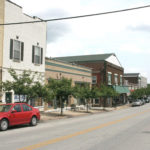Fiona Morgan, News Editor
Over the last year, reports of mold found in Kentucky colleges and universities have increased, specifically in residence halls. Students at Asbury University, University of Louisville (UofL) and Western Kentucky University (WKU) have reported getting sick due to mold exposure.
On Feb. 22, the Asbury Collegian published an article detailing mold and mildew findings in the Kresge dorm and reported residents’ sickness while living in the dorm. No student illnesses were officially diagnosed as a result of mold in the dorms, and Asbury administration responded with plans of eventual renovations.
Associate Dean for Residence Life Joe Bruner explained that the institution has plans of major renovations for Kresge, but as a smaller college with a limited budget, those projects will take time. “Every summer we’ve spent anywhere between $1.7 million down to, like, $450,000 [on residence halls],” said Bruner. “We’re down enrollment, so we’re down budget-wise, so that cuts into the amount of money we’d be able to spend. But that doesn’t mean it’s still not important.”
Asbury’s residence hall budget goes to projects such as the Kresge lobby, laundry room upgrades and bathroom renovations. During summer 2018, workers renovated the Kresge lobby and completed a wifi project to make internet connections more stable in the building. This coming summer, Asbury plans to complete the same wifi project in the Aldersgate apartments and rework the Kresge basement’s air conditioning (HVAC) system.
Bruner explained that the size of the main HVAC unit in Kresge’s basement is contributing to inefficient air flow. “If an HVAC unit is too big, it blows for a little bit then stops; then when it gets humid and the air is just kind of sitting around, the lack of air moving is what can lend to an environment for mildew and mold to grow,” said Bruner.
Bruner said that Asbury has a three- to five-year plan for other Kresge renovations, including replacing HVAC systems in the rest of the building and tearing out bathrooms to replace copper pipes that have been around since Kresge was built in the 70s. “If you go in and replace all the leaky pipes, it’s [going to] cost a lot more than what the lobby did, and it’s [going to] be a lot more invasive,” he said. “We’ll go through $3-4 million on that building.”
Students have also reported what looks like mold inside vents toward the ceiling in the main halls. Bruner said that Asbury plans to bring in a specialist company to inspect and clean those main air ducts. Physical plant workers have been replacing and repairing individual room units one at a time.
Along with hindered air flow, rain and humidity are contributing factors to mold and mildew growth. The Lexington Herald Leader reported that 2018 was the wettest year in Lexington’s history, with 70.62 inches of rain. The previous record was 66.97 inches in 2011.
“Other years when it hasn’t rained that much, we hardly have any issues [with mold or mildew],” said Bruner. “I know it’s an issue that’s important to students, and we’re not being neglectful — we’re trying our hardest to take care of it; the last two years have just been a really difficult time for everybody in the state.” Bruner urges students to report anything that could be mold or mildew to their RAs.
University of Louisville student Bethany Morgan reported getting sick while living in Hilda Threlkeld Hall dorm, which she reported having unsanitary living conditions. On Oct. 31, 2018, Morgan posted on Facebook detailing the situation in her dorm with pictures of large cockroaches in a dorm room, sink and shower and mold/mildew on a bathroom floor, chair, pillow and window and on different residents’ shoes.
In her Facebook post, she wrote, “In Threlkeld Hall, the majority of the students have had many concerns about our living situation. After being sick due to mold exposure, I filled out a fix-it form, as instructed by my RA. When I felt like the issue wasn’t resolved completely I spoke to campus housing as well as my hall director, Dan Foley. While my roommate and I were expressing our concerns about what we had been dealing with, Mr. Foley informed us that since these issues hadn’t reached catastrophic levels yet there was nothing they could do!”
As of Feb. 28, 2019, the post has 18,361 shares. The Courier Journal picked up Morgan’s story and another student’s report of mold in Threlkeld Hall and reported that on Nov. 4, 2018, university housing staff met with 50 to 60 Threlkeld residents to discuss issues in the dorm. Employees then addressed those individual issues immediately after the meeting. However, according to the journal, a student reported that UofL offered no long-term solutions.
Since the beginning of the school year in Sept. 2018, Western Kentucky University’s newspaper, College Heights Herald, published nine articles regarding mold found in campus buildings and an ongoing renovation of Minton Hall dorm due to mold findings.
WKU has approximately 20,000 students and 16 residence halls, with a maintenance request database portal available to students, faculty and staff. WKU Herald reporters searched through over 2,700 pages of maintenance requests and reported that during a year from November 2017 to November 2018, there were 524 reports of mold in campus buildings, 473 of them in dorms.
On Nov. 8, 2018, the Herald reported that Minton Hall would close to address mold found in mechanical spaces in the building and would relocate its 348 residents to other dorms. The dorm was originally scheduled to reopen Jan. 18, but students were notified Jan. 16 that Minton would remain closed until Fall 2019, according to the Herald.
The Herald reported that the cost of original renovations came to $643,000, but additional work will cost over $270,000. The university offered $1000 in credit for spring 2019 housing fees to all the relocated students.



